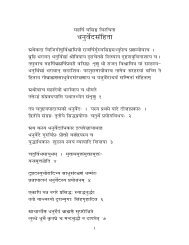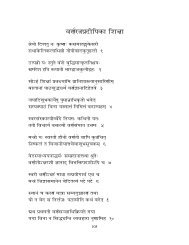You also want an ePaper? Increase the reach of your titles
YUMPU automatically turns print PDFs into web optimized ePapers that Google loves.
\Df] OP $D½DHLW Ne3OY(! VWUQ MOP WDf] OP $D½DHLW NeSX¥(! VWUV WP!<br />
9.161. Whatever result a man obtains who (tries to) cross a (sheet of) water in an unsafe boat, even that result<br />
obtains he who (tries to) pass the gloom (of the next world) with (the help of) bad (substitutes for a real) son.<br />
\ HNLUL.ZQD( 6\DWDP $D(UV @H¥MD( VXWD( \6\ \W S(WN LU.Z V WG{ J},W Q WU!<br />
9.162. If the two heirs of one man be a legitimate son of his body and a son begotten on his wife, each (of the<br />
two sons), to the exclusion of the other, shall take the estate of his (natural) father.<br />
#N #Y $UV! SX¥! LS¦\6\ YVXQ! ¾ X! ]H D>DP $DQ]6\DZ ¾G DW WX ¾M,YQP<br />
9.163. The legitimate son of the body alone (shall be) the owner of the paternal estate; but, in order to avoid<br />
harshness, let him allow a maintenance to the rest.<br />
Ñ WX @H¥M6\ $] ¾G DW S(WNDG{ [QDW $D(UVDH LY MQ GD\ LS¦\ S PP #Y YD<br />
9.164. But when the legitimate son of the body divides the paternal estate, he shall give one-sixth or one-fifth<br />
part of his father’s property to the son begotten on the wife.<br />
$D(UV @H¥MD( SX¥D( LSWLU.Z6\ DLJQD( G] $SUH WX ‘P]DH JDH¥ LU.ZD] DLJQ!<br />
9.165. The legitimate son and the son of the wife (thus) share the father’s estate; but the other tell become<br />
members of the family, and inherit according to their order (each later named on failure of those named earlier).<br />
6Y@H¥H V6N‰WD\D WX 6Y\P 7SDG\H¬i LK \P WP $D(UV LYMDQ,\DW SX¥ ¾DZPNL/SNP<br />
9.166. Him whom a man begets on his own wedded wife, let him know to be a legitimate son of the body<br />
(Aurasa), the first in rank.<br />
\V W/SM! ¾P,W6\ Š,E6\ 9\DL[W6\ YD 6Y[PH5><br />
LQ\X‹D\D V SX¥! @H¥M! 6PW!<br />
9.167. He who was begotten according to the peculiar law (of the Niyoga) on the appointed wife of a dead man,<br />
of a eunuch, or of one diseased, is called a son begotten on a wife (Kshetraga).<br />
PDWD LSWD YD G DWD \P $L¯! SX¥P $DSLG Vf] ¾,LWV\X‹ V `H\DH GL7¥P! VXW!<br />
9.168. That (boy) equal (by caste) whom his mother or his father affectionately give, (confirming the gift) with<br />
(a libation of) water, in times of distress (to a man) as his son, must be considered as an adopted son (Datrima).<br />
Vf] WX ¾Ne\D5G{ \ JX> GDH LYF@>P SX¥ SX¥JX>(U{ \X‹ V LY`H\] F N‰L¥P!<br />
9.169. But he is considered a son made (Kritrima) whom (a man) makes his son, (he being) equal (by caste),<br />
acquainted with (the distinctions between) right and wrong, (and) endowed with filial virtues.<br />
7S WH JKH \V WX Q F `D\HW N6\ V! V JKH J8) 7S¸V W6\ 6\DG{ \6\ W/SM!<br />
9.170. If (a child) be born in a man’s house and his father be not known, he is a son born secretly in the house<br />
(Gudhotpanna), and shall belong to him of whose wife he was born.



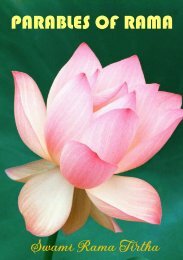
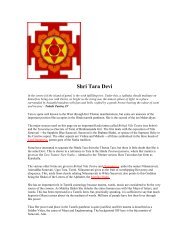
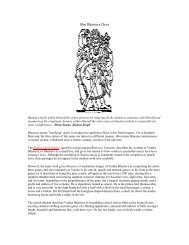
![[ Home ] [ Up ] Books Contact us Immortal Promise ... - Hindu Online](https://img.yumpu.com/9577792/1/190x245/-home-up-books-contact-us-immortal-promise-hindu-online.jpg?quality=85)
